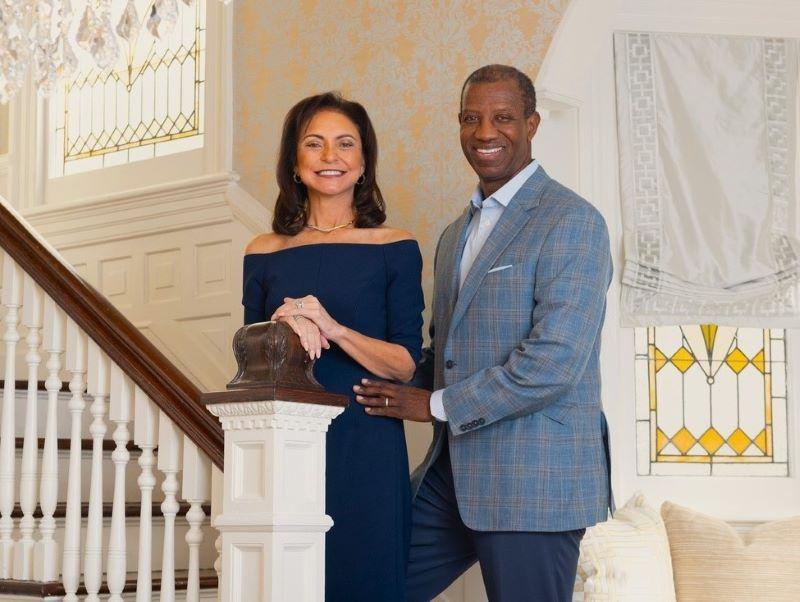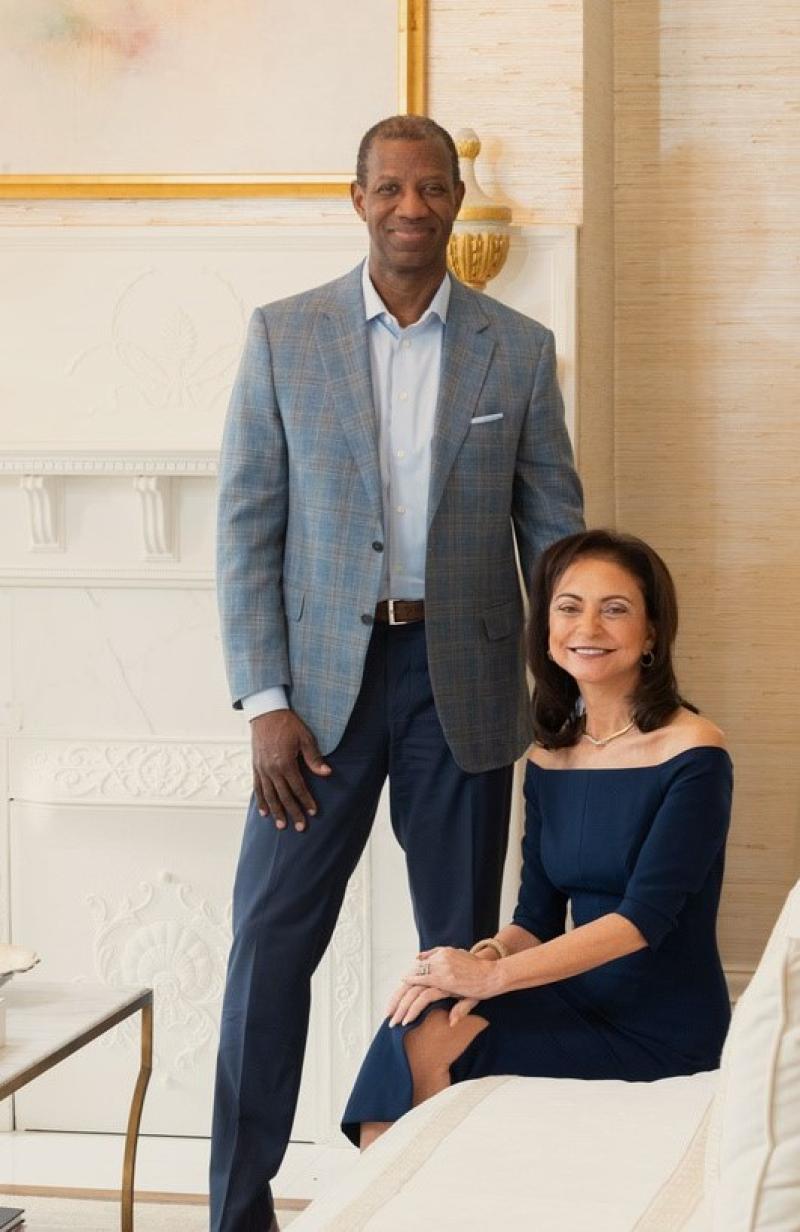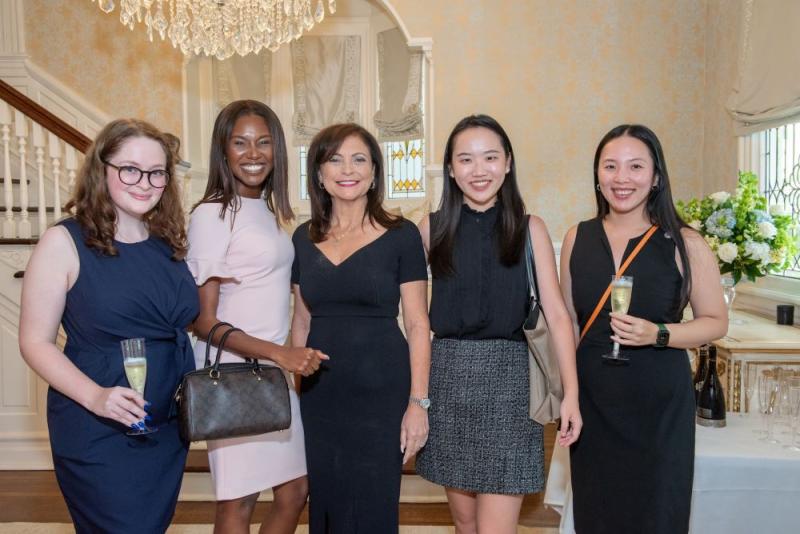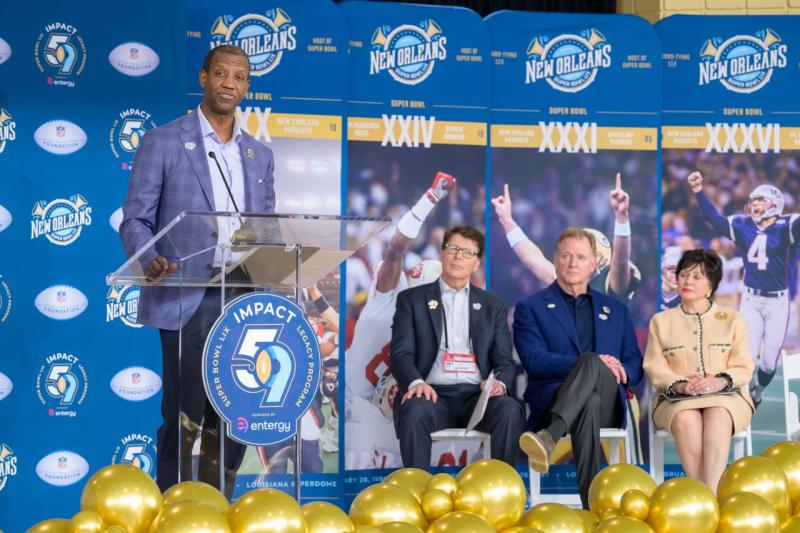United in Service: The Hon. Nannette Jolivette Brown (L'88) & Marcus Brown (B'02)
On any given day, the Hon. Judge Nannette Jolivette Brown, Chief Judge of the Eastern District of Louisiana, is in court, presiding over a myriad of important cases where lives can be forever changed.
Or, she could be on a panel of the local bar association, discussing pressing issues of importance to the legal community, or maybe, taking a quick trip to her alma mater Tulane Law School, where she is a regular lecturer and speaker, and a beloved alumna from the Class of 1988.
Not far from the courthouse, her husband, Marcus Brown, is helping to run Entergy, the $12-billion energy behemoth that serves the region, as its executive vice president and general counsel. Also a Tulane graduate, he has many responsibilities, and in particular, this year served as the Chair of the New Orleans Host Committee for Super Bowl LIX, a job that catapulted him into the spotlight as New Orleans hosted the Super Bowl LIX Feb. 9. Marcus Brown (B'02) also serves on the Board of Tulane, is a member of the advisory board of the Tulane Center for Energy Law and is an alumnus of the A.D. Freeman School of Business.
It's a busy life, the Browns admit, but they make it work. While their professional careers often take them in different directions, it’s clear the Browns make the time to be united in service to the community.
“She is a great partner, mother, and friend,” Marcus said of his wife. “As long as we’re good together, we can do everything else. And I always say that she has made me a better man, person and human being because of her support and consistency.”
Both of them say their fierce support for family and each other’s work – a true partnership – is the key to their personal and professional successes.
“It could be difficult to balance a legal career and family without the great partner that I have in Marcus,” Judge Brown said. “We know what we have to do, we know our roles and I’m so proud of how we have found balance in our lives between family and career.”
Despite their busy schedules, the Browns have in common their sincere desire to live a life of service to their community and the various causes they support. They are both active in the local and state bar associations, and are dedicated Tulanians both through the law school, the business school and the university’s alumni networks. In April, for her dedication to Tulane and her impact on the legal profession, Judge Brown will be inducted into the Tulane Law Hall of Fame, the law school's highest honor.
“The Browns are a story of inspiration, impact, perseverance and a commitment to justice and service,” said Law Dean Marcilynn Burke. “We are immensely grateful for their continued support for Tulane and the law school.”
Judge Brown's journey is a testament to dedication, resilience, and trailblazing achievements in the legal field. A native of Lafayette, she came from a family that valued education and understood that it was the way to a better life.
She pursued higher education with vigor, earning a Bachelor of Arts from the University of Southwestern Louisiana in 1985 in communications. After a time writing for local media, she realized she could do more to help her community as a lawyer and entered Tulane Law School, obtaining her Juris Doctor in 1988 and later a Master of Laws (LLM) in Energy and Environment in 1998.
“There were so many people invested in my success,” recalled Judge Brown. “My church collected money so that I could buy my first typewriter. So many teachers and people in the community helped me, they were so hopeful and invested in my success and future. That, I think, grounded me to always think about community.”
Brown took to environmental law quickly. She had roles in corporate and environmental litigation at prominent law firms in New Orleans and Lafayette, and her expertise and leadership led to her appointment as the City Attorney for New Orleans in 2010, where she was responsible for overseeing all legal matters and city contracts.
In a historic move, President Barack Obama in 2011 nominated Brown to the United States District Court for the Eastern District of Louisiana and she became the first African American woman appointed as a federal district judge to the court. In 2018, she was named Chief Judge of the Eastern District, marking another first in the court's 200-year history.
Judge Brown is committed to education and mentorship. She has served as a teaching fellow at Tulane Law School’s Environmental Law Clinic, was an associate professor at Southern University Law Center, and a visiting assistant clinical professor at Loyola University College of Law. Her dedication to fostering a welcoming environment within the legal community is evident through her involvement with various bar associations and committees.
Throughout her career, Judge Brown has received numerous awards, including the Ernest Morial Award from the Louis A. Martinet Legal Society, honoring her as a trailblazer in the judiciary. Now, she will add Tulane Law Hall of Fame to her many other recognitions.
“When I entered Tulane Law School 35 years ago, I remember how intimidating it was to walk in the shadows of the imposing figures depicted in the paintings that aligned the walls of the law school while recognizing the familiar last names of so many of my classmates, who identified with and spoke personally about their connections to them," she said.
"Although my portrait doesn’t hang in the law school, I hope this recognition can inspire entering law students of the future who are creating first steps for their own families and communities,” Judge Brown added.
In the same spirit, Marcus Brown is the product of small-town America. He grew up as a self-described Air Force brat, being raised on military bases in California and in Alexandria, La., where his family settled. For a time, he thought he wanted to be an engineer and admits that while attending Southern University A&M College, “I stayed in that field way too long.”
Instead, he found a love for English and graduated with a Bachelor of Arts in 1985. He continued his education at Southern University Law Center, obtaining his J.D. in 1988, where he was a member of the law review. He received his MBA from Tulane University's A.B. Freeman School of Business in 2002.
“Law school was much less predictable for me, it was almost an unplanned next step,” he said. “But it was a great step and a great choice and led me to New Orleans.”
And that’s about the time when the Browns' parallel lives intersected.
“There were always Bar (Association) events and we were friends and knew each other,” said Judge Brown, adding, with a laugh, “and he always struck me as being very confident.”
Judge Brown, meanwhile, was hearing from friends that Marcus was “just perfect for you.”
At one event, they decided to go together, and everything just clicked; the rest is, as they say, history. As Marcus Brown recalls with a broad smile, he thought the woman whom he felt was way out of his reach had finally agreed to date him – and he was thrilled.
That date has now turned into 35 years of marriage, two grown children who made the Brown home the "happening" place, the safe place where the “dad of all dads”— Marcus —always had an open ear for his kids’ friends. Of course, the couple always managed the tug and pull of juggling two highly successful careers.
Before joining Entergy in 1995, Brown practiced law at the New Orleans-based firm Stone Pigman, focusing on commercial litigation, copyright and trademark protection, and constitutional law. At Entergy, he initially served as vice president and deputy general counsel, managing areas such as commercial and general litigation, affiliate rules of compliance, bankruptcy, casualty litigation, and consumer law.
Throughout his tenure, Brown has been instrumental in several community initiatives. Following hurricanes Katrina, Rita, and Ike, he led efforts to secure over $500 million in insurance proceeds, crucial for rebuilding Entergy's damaged electric and gas infrastructure. He also played a pivotal role in guiding Entergy out of bankruptcy.
Under Brown's leadership, Entergy's legal department has significantly increased its pro bono commitments. In 2012, he launched an initiative that led company lawyers and paralegals to provide over 10,000 hours of pro bono services by the end of 2017. This dedication earned the department several notable recognitions, including the Corporate Pro Bono Organization’s 2016 Pro Bono Partner Award. In 2018, Entergy furthered this commitment by appointing its first full-time pro bono counsel.
As a member of the Tulane Center for Energy Law's Advisory Board, Marcus Brown adds his expertise to the law school’s programs and training of future energy lawyers.
“We are very fortunate to count Marcus Brown among our board members,” said Frederic Sourgens, director of Tulane’s Center for Energy Law. “His experience and commitment to this field of law is an important voice that can guide our Center into the future, and help our students prepare for the evolving nature of this industry.”
Marcus Brown's legal contributions have been widely recognized. In 2020, the Financial Times named him among the top in-house general counsels globally. The National Legal Aid and Defender Association honored him with the 2020 Exemplar Award. Additionally, the New Orleans Bar Association presented him with its Presidents' Award in 2018, acknowledging his commitment to community service and high ethical standards.
If you ask his wife, she will tell you it’s his big heart and commitment to those who are marginalized that make him an incredible partner.
"I am so proud of Marcus; he has such a giving spirit and does so many things quietly and without fanfare,” she said. Marcus, she said, keeps blankets, food and snacks in his car and routinely stops to provide these for homeless people that live near his workplace around the city.
“They know him and he tries to connect them with services (the couple are actively involved in the United Way),” she said. “It takes a special person to connect with people that others would just ignore.”
The Browns point to Tulane as a place that granted them opportunities, and that made a difference for both.
“The law school was a place that if a program wasn’t available, they would help you create it,” said Judge Brown. “I was able to get an externship with a federal judge, and she really taught me about the practice of law and gave me the momentum and drive to continue to learn and grow in the profession.”
Marcus Brown’s experience at Freeman was similar – the MBA program gave him opportunities to learn more as he was transitioning into greater corporate leadership roles.
“The program provided a meaningful way of immersing us in cross-functional teams and giving us the ability to learn how to use information and deploy subject matter experts and really be successful in our work,” he said. “Tulane really develops people and so many of our graduates have been colleagues or mentors or teammates and they have all had an impact on my life.”




